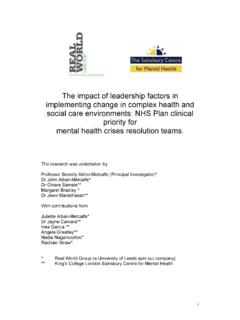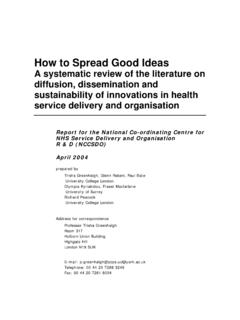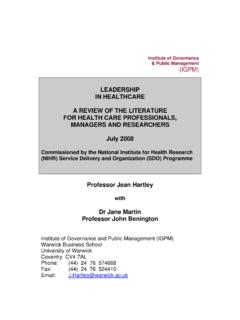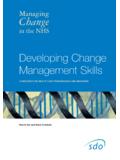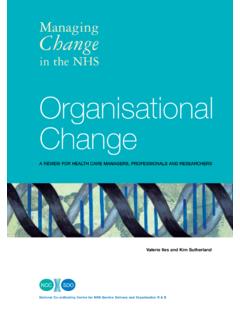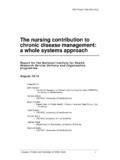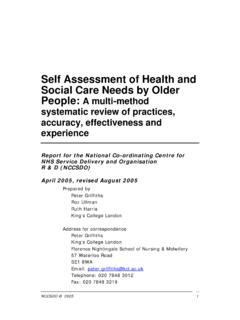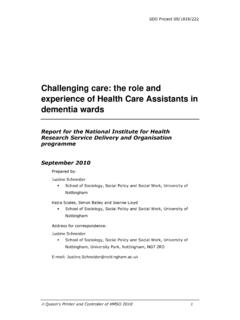Transcription of Organisational Change - netscc.ac.uk
1 OrganisationalChangeA REVIEW FOR HEALTH CARE MANAGERS, PROFESSIONALS AND RESEARCHERSM anagingChangein the NHSV alerie Iles and Kim SutherlandManagingChangein the NHSO rganisationalChangeA REVIEW FOR HEALTH CARE MANAGERS, PROFESSIONALS AND RESEARCHERSV alerie Iles and Kim SutherlandContentsPurpose and does the literature come from? kind of evidence does it provide? is meant by Change ? Change in the to access the can we understand complexity, 25interdependence and fragmentation?Weisbord s Six-Box Organisational Model257S Model27 PESTELI29 Five Whys30 Content, Context and Process Model32 Soft Systems Methodology34 Process modelling36 Process flow37 Influence diagram38 Theory of Constraints (TOC) do we need to Change ?40 SWOT and what can Change ?42 Force field analysis43 Sources and potency of forces 45 Readiness and capability 46 Commitment, enrolment and compliance47 Organisation-level Change interventions48 Total Quality Management (TQM)48 Business Process Reengineering (BPR)50 Group-level Change interventions54 Parallel learning structures54 Self-managed teams55 Individual-level Change interventions56 Innovation research56 Securing individual behaviour change58 Part 1 The literature on changemanagementPart 2 Tools, models and approaches:a selective reviewManagingChangein the NHSPart 3 Reflections on can we make Change happen?
2 60 Organisational development (OD)60 Organisational learning and the Learning Organisation63 Action research66 Project with using available an evidence evidence for local for future research79 Appendix 1 Search strategy84 Appendix 2 Summary of empirical 85research on effectiveness of Change models in health care organisations 1990 1999 Appendix 3 What is systems thinking? 89 Appendix 4 development of a Change 91management resourceAppendix 5 Participants at the Change 92management workshop and seminar94 Purpose of this reviewThis review aims to provide a resource and reference tool to help readers findtheir way around the literature on Change management and consider theevidence available about different approaches to Iles, Really Learning and London School of Hygiene & Tropical Medicine, University of LondonKim Sutherland, Judge Institute of Management Studies, University of CambridgeProject sponsorsMaureen Dalziel, Director NCCSDON aomi Fulop, Deputy Director NCCSDOP rofessor Sir John Pattison, Director, NHS SDO R & D ProgrammeSteering groupMaureen Dalziel, NCCSDO (Chair)
3 Sandra Dawson, Judge Institute of Management Studies, University of CambridgeEwan Ferlie, Management School, Imperial College of Science, Technology and Medicine, University of LondonNaomi Fulop, NCCSDOV alerie Iles, Really Learning and London School of Hygiene & Tropical Medicine,University of LondonProject management (NCCSDO)Helena Ward, Gr inne Kavanagh and Pamela TimmsProject communication and editorial consultantsMarsaili Cameron, Steve Cranfield (managing editor Review), Margaret Mellor and Jud Stone. Design by copiesKate Thomas, Co-ordinatorNCCSDOL ondon School of Hygiene & Tropical Medicine99 Gower StreetLondon WC1E 6 AZTel: +44 (0) 20 7612 7980 Fax: + 44 (0) 20 7612 7979 Email: of issue: May 20015 ManagingChangein the NHSA cknowledgementsPeer reviewersHuw Davies, Reader in Healthcare Policy and Management, Department of Management, University of St AndrewsNigel Edwards, Policy Director, The NHS Confederation Pam Garside, Management Consultant, NewhealthLaurie McMahon, Executive Director for Professional Practice, Office of Public Management Annabel Scarfe, Head of Organisation development , NHS Executive London RegionWe are grateful to the large number of people who contributed to the nationallistening exercise conducted by the NCCSDO in autumn 1999.
4 And also to thosewho attended the Change Management and Quality Improvement workshop(4 April 2000) and the seminar Managing Change in the NHS (12 July 2000).See Appendix 5 for lists of participants at the workshop and are grateful to the following for their kind permission to use quoted andcopyright material:Jossey-Bass Inc. (Figure 1); Perseus Books (Figure 3); Sage Publications Ltd.(Figure 5); John Wiley & Sons Ltd (Figure 6); Kate Grimes, King s College Hospital( Transforming Healthcare Delivery , Improving referral processes , andFigure 7);Addison-Wesley (Table 2); Andrew Paterson, Enfield Community Care NHS Trust(Figure 10).Every effort has been made to identify and contact copyright owners. The publishers would be pleased to hear from anyone whose rights have beenunwittingly document was commissioned and funded by the SDO R & D Programme,a national research programme managed by the National Co-ordinating Centrefor NHS Service Delivery and Organisation under contract from the NHSE R & need for Change in the health service is now widely recognised by public,by professions and by government.
5 The NHS Plan, issued last year, requires afundamental Change in thinking, practice and delivery of health care over thenext challenges for those working towards meeting the Plan s ambitious changeagenda are clear. We know that practising managers and professionals arekeen to meet these challenges, to improve services by learning from theresearch literature and to base their decisions in evidence where possible. Many people in the NHS, however, are not familiar with the thinking aboutmanagement of Change which has come out of schools of management,psychology, sociology, and economics, over the last fifty years. Many who areaware of some of the concepts do not appreciate the contexts in which theywere developed, nor the purposes to which they may be put in the process ofmanaging Change . Important insights and guidance which the literature offersare thus not being used to maximum document is one of two SDO publications on Change management thesecond is a booklet summarising key lessons designed with the needs ofdifferent audiences in mind but with the single aim of helping people to bridgethis gap between the commitment to Change and action.
6 Drawing uponexpertise from the Judge Institute of Management Studies, University ofCambridge, and benefiting from the advice of other academic colleagues, andcolleagues in the NHS and other sectors, we have produced in this publicationwhat we hope is a succinct and user-friendly review of the literature andevidence on Change that the whole NHS can draw trust that significant lessons for Change will be drawn from this review andits sister publication and that they will stimulate further debate and inquiry in thisimportant Sir John PattisonDirectorNHS SDO R & D ProgrammeForeword7 ManagingChangein the NHSI ntroductionBackgroundIn the White Paper, A First Class Service(DOH, 1998) the NCCSDO wascommissioned to undertake a review of the evidence in the field of changemanagement, as follows (Section ): Change may be an imprecise science, but evidence is available on whatworks and what does not, and the NHS must make use of this.
7 The[NCCSDO] will review existing research findings of relevance to changemanagement and quality improvement in the NHS. It will also commissionnew studies to improve the knowledge base. This work will be madeavailable in a user-friendly format for the whole NHS to draw the autumn of 1999, the SDO programme carried out a national listeningexercise which brought together those who make use of and those who deliverhealth care services (Fulop and Allen, 2000). Participants were asked: What are the most important issues, for thosedelivering and organising services and for those making use of those services?Why is there so often a gap between research evidence and implementation atpolicy and local levels? What can be done to help promote research as a leverfor Change in the NHS? One area of common concern was the implementationand management of response two initial publications have been prepared, under the title Managing Change in the NHS.
8 Organisational Change : a review for health care managers, professionals and researchersis a resource and reference tool designed to help readersfind their way around the literature on Change management and consider theevidence available about different approaches to Change . Making Informed Decisions on Change : key points for health care managers and professionalsis a booklet summarising the key lessons and points foraction to be drawn from theory and of the reviewOrganisational Change : a review for health care managers and professionalsand researcherssets out to: describe relevant approaches and concepts which have been developed in schools of management, psychology, sociology, economics and other fieldsover the last fifty years discuss the context in which these approaches and concepts were developed, and the uses to which they may be put in the process ofmanaging Change consider the evidence that is available about the efficacy of these approaches begin a discussion about the nature of evidence in this field and the differences between evidence that is useful for clinical and for will it benefit?
9 It is primarily intended for managers, professionals and researchers involved inchange management issues across the NHS. It will also be of interest to thoseresponsible for policy, strategy and operational work that is engaging with, orcomplementing, Change management strategies and initiatives. It is also likely to beof interest to Organisational and Change management consultants and does it contain?Part 1 provides an introduction to the literature on Change management: wherethis comes from; the kinds of evidence it provides; a discussion of key termsand concepts; and how the literature can be applied to the context of the 2 presents a review of the main models, approaches and tools which arelikely to be of interest and use to practising managers1and professionals in thehealth 3 provides some reflections on the nature of evidence in this field, withsuggestions for further research, based on the preceding series of appendices provides further information on the methodology of thereview, a summary of empirical research studies in the field, a brief overview ofsystems thinking, suggested areas of activity, and expertise that may beavailable from local Organisational development (OD) resources, and lists ofparticipants at events which helped to inform the development of the changemanagement resources.
10 ScopeThe document aims to provide a selective review of key Change models andassociated evidence rather than a comprehensive introduction to changemanagement, its many schools, concepts and techniques, for which alternativeresources are readily available. For reasons of length, we also touch only brieflyon some important factors bearing on Change , such as Organisational cultureand political factors (both macro and micro ). For the same reason caseexamples are used sparingly, to illustrate certain tools and review focuses on Organisational Change there are related fields of studywhich lie outside its scope. One is leadership and the attributes of successfulleaders. Another is the use of incentives as a driver for Change . The third is policy and any regulatory factors which may facilitate or inhibit theimplementation of changes on the ground, especially those which involve otheragencies with different accountabilities and governance term should be understood toinclude all health professionals whomanage people and resources, and notjust those with managerin their job the NHSA pproach and methodIn order to explore this large and complex field a multi-method approach was , a list of key theories and concepts was defined after reference to generalmanagement texts and review articles addressing Change management, as wellas through consultation and discussion with academics, managementconsultants and NHS managers.
